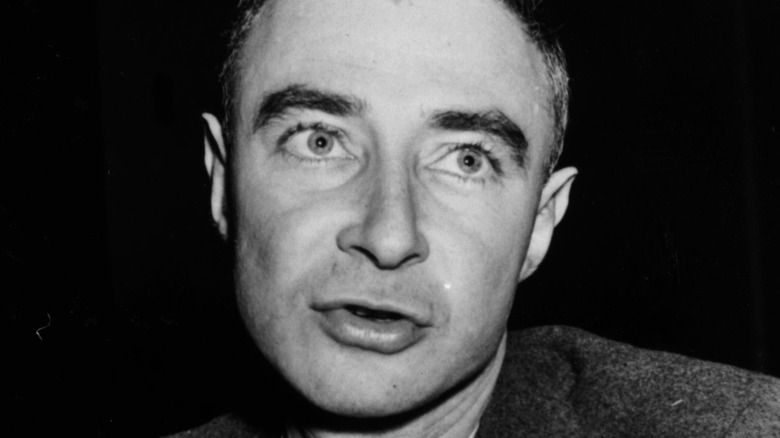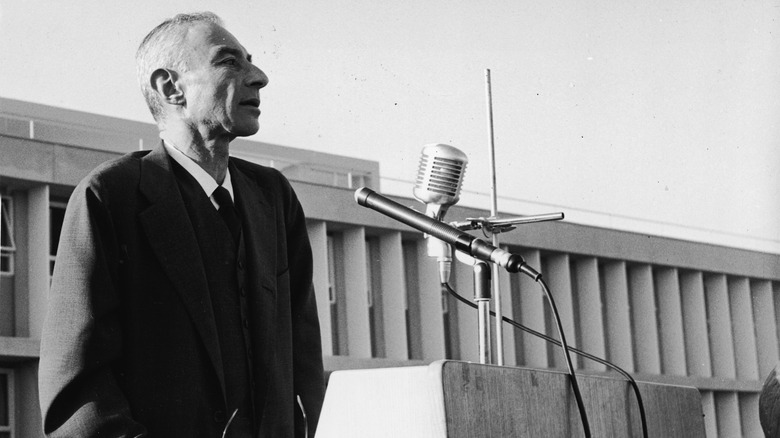Why J. Robert Oppenheimer Leaving Cambridge Was The Best Thing That Could Happen For Him
J. Robert Oppenheimer has a complicated but astounding legacy. Per Biography, he's widely known as the "father of the atomic bomb." This, of course, is a reference to his role in the Manhattan Project and the advancement of nuclear weapons during the 1940s. Lemelson-MIT writes that Oppenheimer was a precocious youth. Born in 1904, he became interested in physics and chemistry when he was just 10 years old. By 1922, Oppenheimer was a student at Harvard University. He graduated in three years and left for Cambridge University to further his studies in physics.
The Atomic Archive reports that Oppenheimer's mentor at Cambridge was J.J. Thomson. According to the Science History Institute, Thomson discovered the electron in 1897 and in 1906, he was awarded the Nobel Prize in Physics. The Institute for Advanced Study (IAS) states that Oppenheimer was Thomson's research assistant. However, it seems that Oppenheimer was not fully satisfied with his position or his studies in Cambridge (via the Atomic Heritage Foundation). Christ's College Cambridge notes that he only spent two semesters at the institution before departing. In 1926, Oppenheimer accepted an invitation from Max Born to study theoretical physics in Germany at the University of Göttingen.
J. Robert Oppenheimer in Germany
According to the Atomic Heritage Foundation, Max Born was the director of the Institute of Theoretical Physics at the University of Göttingen. The Atomic Archive explains that he is remembered for his work in quantum theory. Like J. Robert Oppenheimer, Born also studied under J.J. Thomson (via the Nobel Prize). That said, Britannica reports that Oppenheimer thrived at Göttingen and was able to meet likeminded physicists including Niels Bohr and P.A.M. Dirac. Bohr, per Biography, is known for his contributions regarding atomic structures. Dirac, on the other hand, furthered quantum theory (per the Nobel Prize). Christ's College Cambridge writes that Oppenheimer went on to publish several papers on quantum mechanics while at Göttingen.
In March 1927, at barely 23 years of age, Oppenheimer received a Doctor of Philosophy degree from the University of Göttingen (via Christ's College Cambridge). The Institute for Advanced Study notes that around the same time, Born and Oppenheimer were working on what is now known as the Born-Oppenheimer Approximation. In simple terms, Chemistry LibreTexts explains that the approximation centers on separating nuclear motion from electron motion. This, in turn, disregards nuclear motion and makes calculations as straightforward as they can possibly be. Furthermore, it takes into account that the mass of a nucleus in a molecule is greater than the mass of an electron.
His work in Germany led to various career opportunities
The Atomic Archive writes that upon graduating from the University of Göttingen, J. Robert Oppenheimer left Germany for the United States and returned to study at Harvard and later the California Institute of Technology. According to Christ's College Cambridge, Oppenheimer also continued his work on quantum mechanics by visiting various European institutions including the University of Leiden in the Netherlands. Lemelson-MIT reports that by 1929, Oppenheimer was a professor at the University of California at Berkeley and at the California Institute of Technology. Fellow physicist Hans Bethe noted, "His lectures were a great experience, for experimental as well as theoretical physicists," (via the Institute for Advanced Study). Bethe went on to say, "He never gave his students the easy and superficial answers but trained them to appreciate and work on the deep problems." However, in 1942, Oppenheimer was appointed to the now-infamous Manhattan Project to develop nuclear bombs for use in World War II (per Britannica).
Although this is arguably Oppenheimer's claim to fame in the mainstream media, Christ's College Cambridge writes that after the bombing of Nagasaki, he opposed the creation of nuclear weapons. Lemelson-MIT states that this later led him to lose his position at the Atomic Energy Commission. As for Oppenheimer's mentor at the University of Göttingen, the Jewish Virtual Library explains that Max Born, who was Jewish, left Nazi Germany in 1933. Like Oppenheimer, he was distressed that physics was used for destruction.


